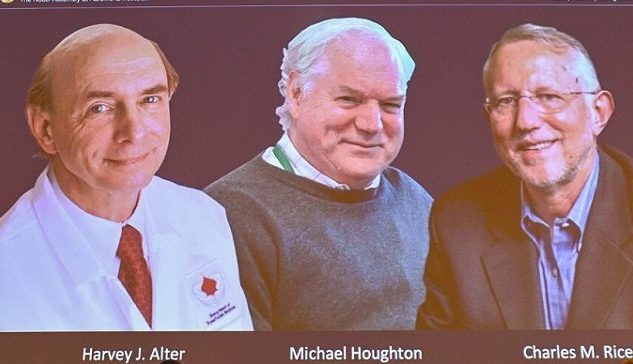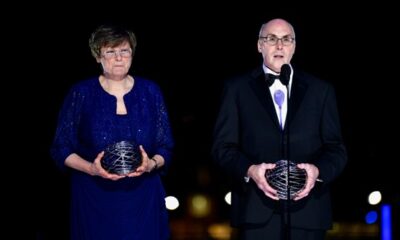
Featured Item

Two Jews win two Nobel prizes in two days
Two Jewish scientists are part of teams that were awarded Nobel prizes in the space of 48 hours, on 5 and 6 October.
Harvey Alter along with Charles Rice and British-born scientist Michael Houghton jointly won the Nobel Prize for medicine on Monday for their discovery of the hepatitis C virus, a major source of liver disease that affects millions worldwide, according to the Times of Israel (TOI).
Alter, who is Jewish, described the 04:45 phone call he got from Stockholm as “the best alarm clock I’ve ever had”. He said he ignored the first two times the phone rang before “angrily” answering it the third time, adding that his anger went away “in about a second”.
Announcing the prize, the Nobel committee noted that the trio’s work identified a major source of blood-borne hepatitis that couldn’t be explained by the previously discovered hepatitis A and B viruses. Their work, dating back to the 1970s and 1980s, has helped save millions of lives.
The Forward described his win as “the success of Jewish America”. Delving into how American Jewish immigrants dreamed about their children becoming doctors, writer David Ian Klein notes, “Hearing the news of his award today, it doesn’t just honour exemplary research in the field of medicine, but a century of Jewish American experiences, and the tenacious dream that the future can be better for our children.”
Sir Roger Penrose, Reinhard Genzel, and Andrea Ghez won the Nobel Prize in physics for “the discovery of a supermassive compact object at the centre of our galaxy”.
TOI describes how both Penrose and Ghez have “Jewish heritage”. “Ghez’s grandfather on her father’s side, a Jew of Tunisian origin, fled Italy for the United States after the fascists passed anti-Jewish laws in 1938. Penrose’s grandmother, Sonia Marie Natanson, was a Jewish concert pianist who left Russia at the end of the 19th century.” However, she doesn’t identify as Jewish.
The Nobel committee said black holes “still pose many questions that beg answers and motivate future research. Not only questions about their inner structure, but also questions about how to test our theory of gravity under the extreme conditions in the immediate vicinity of a black hole.”
Ghez is the fourth woman to be awarded the Nobel Prize for physics, after Marie Curie in 1903, Maria Goeppert-Mayer in 1963, and Donna Strickland in 2018.
“I hope I can inspire other young women into the field. It’s a field that has so many pleasures. And if you’re passionate about the science, there’s so much that can be done,” Ghez said, according to Time magazine.
Nobel Prizes have been awarded to more than 900 individuals, of whom at least 20% were Jews although the Jewish population comprises less than 0.2% of the world’s population.










